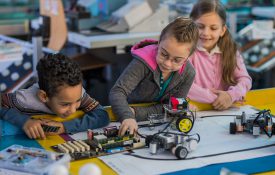-

Getting Hands-On Deepens Science Learning
Students who use hands-on approaches to test or demonstrate scientific concepts understand the concepts more deeply and score better on science tests.
-
QUIZ SCORES GO UP WHEN STUDENTS FEEL PHYSICS
Futurity: Students who physically experience scientific concepts understand them more deeply and score better on science tests, according to a new study. Brain scans showed that students who took a hands-on approach to learning had
-
Smart tips for parents about “educational” apps for kids
CBS: Tens of thousands of supposedly educational apps aimed at young children are little more than “digital candy” that offer few benefits for youngsters, according to a new study. The research, published in the journal
-
Four ways to tell if an educational app will actually help your child learn
The Conversation: Imagine someone telling you that a new technology would be available in five years that has the potential to revolutionise childhood and early education. But the downside is that you will have to
-
Teaching Current Directions in Psychological Science
Aimed at integrating cutting-edge psychological science into the classroom, Teaching Current Directions in Psychological Science offers advice and how-to guidance about teaching a particular area of research or topic in psychological science that has been
-
Preaching About Teaching
The study of how people learn stems back to the infancy of psychological science, when pioneers such as B.F. Skinner, William James, and Edward Thorndike developed “learning science” with the goal of telling teachers what

